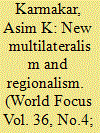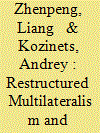| Srl | Item |
| 1 |
ID:
134412


|
|
|
|
|
| Summary/Abstract |
This article analyses Mexico’s presidency of the G20 in 2012 as seen through the lens of new multilateralism, with a particular focus on civil society’s growing demand for participation in the shaping of the global agenda. On one hand, we examine the mechanisms for inclusion and participation provided by the Ministry of Foreign Affairs for that specific purpose. On the other, we reflect on the real results of these mechanisms in practice during the Los Cabos Summit. Drawing on our empirical observations, we argue that G20 summits are still very much ‘protocol as usual’, with echoes of traditional multilateralism, thus leaving very little room for civil society to have a noticeable effect on the summit’s conclusions. On a more positive note, the very existence of such mechanisms suggests that the Ministry of Foreign Affairs has at least given symbolic recognition to the importance of having spaces and dialogues available to civil society as part of the presidency’s agenda.
|
|
|
|
|
|
|
|
|
|
|
|
|
|
|
|
| 2 |
ID:
138365


|
|
|
|
|
| Summary/Abstract |
Over the last two decades and more, the world has had witnessed rapid expansion of global trade and reduction in tariff rates both through the multilateral arrangements under the WTO as well as various types of trade cooperation agreements including RTAs. And India as an emerging giant and an efficient economic diplomat meanwhile placed itself as a key player in expanding world trade as well as reducing the tariff rates that so far distorted the world affairs. Eventually she is increasingly becoming a harsh critic of developed countries which still are resorting to the use of non-tariff measures (NTMs) to protect their domestic home and industry.
|
|
|
|
|
|
|
|
|
|
|
|
|
|
|
|
| 3 |
ID:
192515


|
|
|
|
|
| Summary/Abstract |
Unlike the multilateral institutions of the past formed by hegemons in accordance with their interests, the multilateral format of the SCO (Shanghai Cooperation Organization) has given anew impetus to inclusive multilateral regional cooperation. In order to promote inclusive cooperation in Eurasia, the SCO member states have formulated strategic plans for cooperation in the main subregions and key areas of the organization's activities. New SCO plans to intensify cooperation consider the principle of inclusiveness and promote a system of compatibility of interests among members. Considering the relatively vague and "blurred" forms of cooperation existing among the member states, a quantitative increase in the SCO membership can both create new challenges and contribute to the emergence of new interaction formats. Thus, the introduction of new forms of "small multilateralism" may become relevant for enhancing the effectiveness of the SCO.
|
|
|
|
|
|
|
|
|
|
|
|
|
|
|
|